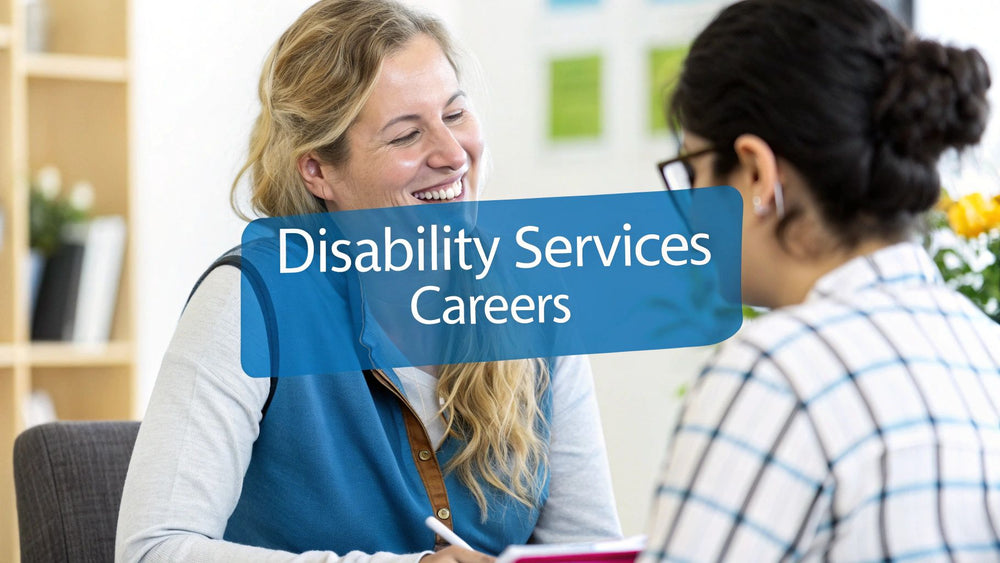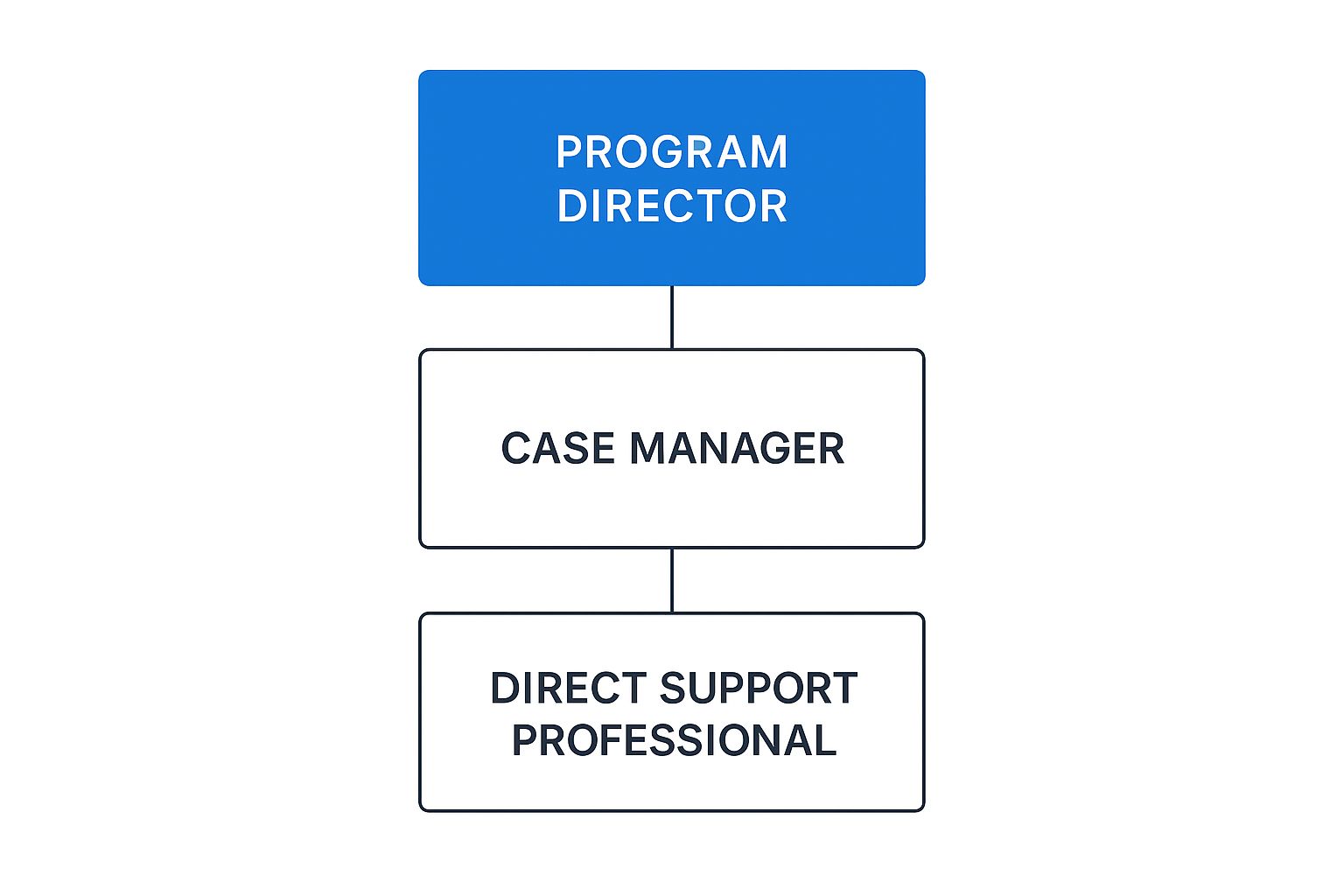Careers in Disability Services: Start Your Fulfilling Journey

Choosing a career in disability services is about so much more than just 'caring for' people. It's about becoming a partner, an ally, and a facilitator, empowering individuals to live the life they choose, on their own terms. This is a dynamic, rapidly growing sector filled with diverse roles that offer a deep sense of purpose and personal satisfaction.

A Guide to Starting Your Journey
Embarking on a career in disability services is a choice to walk a path defined by partnership and purpose. The old, outdated models of care are long gone. Today, the focus is squarely on building collaborative relationships that give individuals genuine choice and control over their lives.
Think of yourself less as a caregiver and more as a strategic partner or a guide. Your role is to help people navigate opportunities, connect with community resources, and find creative ways to overcome barriers. It’s this fundamental shift that makes the work so incredibly impactful and rewarding.
What to Expect From This Career Path
The disability services sector is one of Australia's fastest-growing industries, and for good reason. The rollout of the National Disability Insurance Scheme (NDIS) has created a massive demand for skilled, empathetic professionals, which translates to fantastic job security.
But it’s far more than just a stable job. It's an opportunity to see the real-world difference you make every single day. At its core, the work revolves around a few key principles:
- Promoting Independence: You’ll be assisting individuals with daily living, but always with an eye toward building their own skills and confidence.
- Fostering Connection: A huge part of the job is helping people engage with their community, explore hobbies, and build strong, meaningful relationships.
- Championing Choice: You are there to support clients in making their own decisions—about their goals, their support, and their lifestyle.
At its heart, a career in disability services is about seeing the person, not the disability. It’s about taking the time to understand their unique strengths, passions, and goals, and then working right alongside them to help make those dreams a reality.
This guide is here to give you a realistic, inspiring look at what this career path truly involves. We'll explore the different roles available, what qualifications you'll need, and the pathways you can take to grow professionally. By the time you're done, you’ll have a clear picture of how you can build a fulfilling career and contribute to a more inclusive Australia.
To start, here’s a quick overview of what a career in this sector looks like.
Disability Services Careers at a Glance
This table provides a snapshot of the core elements, challenges, and rewards you can expect when working in the disability services sector.
| Aspect | Description |
|---|---|
| Core Mission | To empower individuals with disability, promoting their independence, inclusion, and choice in all aspects of life. |
| Key Attribute | A modern focus on collaboration and partnership, moving away from traditional, one-way caregiving. |
| Primary Driver | The National Disability Insurance Scheme (NDIS), which is fuelling massive sector growth and job demand. |
| Essential Skills | Empathy, patience, resilience, and creative problem-solving are just as vital as any formal qualification. |
| Main Reward | The deep, personal satisfaction that comes from making a direct, positive impact on someone's quality of life. |
| Potential Challenge | The work can be emotionally demanding, requiring strong personal resilience and good professional support networks. |
As you can see, it's a field that asks a lot of you, but the returns—both personal and professional—are immeasurable.
Exploring the Diverse Roles in the Sector
When most people think about a career in disability services, their mind usually jumps to one specific role: the direct support worker. And while that's an absolutely essential, foundational job, it’s really just one piece of a much larger and more interesting puzzle. The sector is a rich ecosystem of different professions, each playing a unique part in empowering people with disabilities.

A good way to think about it is like a well-coordinated team building a house. You have the hands-on builders laying the bricks (that’s your Direct Support Workers). Then you have the architects who design the blueprints to make sure the house meets the owner’s needs (Support Coordinators). And of course, you need specialised electricians and plumbers to make sure everything works perfectly (Allied Health Professionals). Each role is distinct, but they all have to work together to create a safe, functional, and supportive home.
Let's break down some of these key roles so you can get a clearer picture of where you might fit in.
Hands-On and Direct Support Roles
These are the frontline roles, the ones focused on providing that direct, person-to-person support. People in these positions are collaborators, mentors, and facilitators who work alongside individuals, helping them tackle daily goals and build genuine independence.
-
Disability Support Worker: This really is the cornerstone role. A typical day is never typical. It might involve assisting with personal care, preparing meals together, supporting someone at their local art class, or figuring out the public transport system. The philosophy here is always "doing with," not "doing for."
-
Allied Health Assistant (AHA): Working under the guidance of professionals like physiotherapists or occupational therapists, an AHA helps put therapeutic programs into action. This could mean guiding a client through their prescribed exercises, helping set up assistive technology, or carefully documenting their progress towards a therapy goal.
Strategic and Coordination Roles
Moving beyond the daily hands-on tasks, these roles are all about planning, navigating complex systems, and coordinating services. These are the strategic thinkers who ensure all the different pieces of a person’s support plan fit together perfectly.
-
Support Coordinator: If the NDIS is a complex road map, the Support Coordinator is the expert navigator. Their job is to help individuals and their families understand their NDIS plan, connect them with the right providers, and make sure their funding is managed effectively. They’re there to ensure the plan actually delivers the best possible outcomes.
-
Behaviour Support Practitioner: This is a highly specialised role, usually for professionals with a background in psychology or a related discipline. They work with individuals who have complex behavioural needs, developing positive, person-centred strategies to improve their quality of life and reduce challenging behaviours.
Skill-Building and Educational Roles
These roles are centred on teaching and development, helping people learn new skills that open up doors to greater independence and community life. Think of them as the educators and coaches of the sector.
A fantastic example is the Developmental Educator. This professional designs and delivers skill-building programs tailored to what an individual wants to achieve. That could be anything from learning social skills and managing money to developing problem-solving strategies—all essential tools for living more autonomously.
No matter the specific job title, the ultimate goal across all these careers is to create pathways to greater inclusion and opportunity. This isn't just about providing support; it's about advocating for a more accessible society where everyone can participate fully.
Understanding this context is vital, especially when you look at the bigger employment picture. Among employed Australians aged 15–64 with a disability, people are more likely to work as labourers (12%) compared to those without a disability (8.8%). This highlights just how critical it is to have diverse career pathways and support systems that help individuals access a much wider range of professional, technical, and administrative roles. You can dig into these employment patterns by exploring the latest data on disability in Australia.
From hands-on care to strategic planning and therapeutic intervention, the career options are incredibly far-reaching. By understanding this diversity, you’re in a much better position to find a role that truly aligns with your skills, your interests, and your passion for making a real difference.
Getting the Right Qualifications and Skills

So, you're thinking about a career in disability services? That's fantastic. It's an incredibly rewarding path, but like any profession, you need the right tools to do a great job.
Think of it like building a house. Your qualifications are the solid foundation and frame—they give you the structure and prove you know the rules. Your personal skills, on the other hand, are the interior design and finishing touches—they're what make the house a warm, welcoming home. You absolutely need both to succeed.
Let's break down exactly what you'll need to get started and truly shine in this field.
Building Your Formal Education
While a big heart and a desire to help are non-negotiable, formal qualifications give you the practical knowledge to provide safe, effective, and high-quality support. They're your ticket into the sector and the launching pad for your entire career.
The most common entry point is through Vocational Education and Training (VET) courses, which are all about hands-on, job-ready skills.
-
Certificate III in Individual Support (Disability): This is the go-to starting point for most disability support worker roles. It covers all the essentials, like person-centred care, safety protocols, and clear communication.
-
Certificate IV in Disability: Once you've got some experience under your belt, this is a brilliant next step. It digs deeper, teaching you how to support people with more complex needs, empower them to take control, and provide specialised support.
If you’re aiming for roles with more strategic oversight or a clinical focus, a university degree might be your best bet. Degrees in Social Work, Occupational Therapy, Psychology, or Developmental Education can open doors to careers like Support Coordination, Behaviour Support, or Allied Health.
Your formal qualification isn't just a piece of paper. It’s your professional pledge. It tells clients and their families that you're equipped with the proven knowledge to support them ethically and effectively.
The Must-Have Mandatory Checks
Before you can set foot on the job, there are a few essential checks you'll need to complete. These aren't just red tape; they are fundamental safeguards for the wellbeing of every person you'll support.
Think of them as the final safety inspection before you're handed the keys.
-
NDIS Worker Screening Check: This is a national background check to confirm you're suitable to work with people with disability. It's mandatory for anyone in a risk-assessed role with a registered NDIS provider.
-
First Aid and CPR Certification: Things can happen unexpectedly. Holding current certificates in First Aid (HLTAID011) and CPR (HLTAID009) means you’ll have the confidence and skills to handle a medical emergency.
-
Working with Children Check: If your work involves supporting anyone under 18, this is another non-negotiable requirement.
Beyond the Certificate: The Skills That Truly Matter
Qualifications will get you in the door, but it’s your 'soft skills' that will make you a truly exceptional support worker. These are the human qualities that build trust, navigate tough moments, and forge genuine connections. This is where the magic happens.
These skills are the heart of what we do. Some of the most vital ones include:
- Empathy and Compassion: This is the bedrock of the job—the ability to genuinely try to understand what someone else is experiencing.
- Resilience: Some days will be tough. Being able to bounce back is crucial for your own wellbeing and your ability to keep showing up for others.
- Patience: People achieve their goals on their own timeline, not yours. Real support means walking alongside them at their pace.
- Creative Problem-Solving: No two days are the same. You'll constantly need to think on your feet to find practical, creative solutions to new challenges.
These are the attributes that separate good support from life-changing support. To dive a little deeper, you can read more about the 8 essential disability support worker skills for 2025.
How to Advance Your Disability Services Career
Starting in disability services isn't just a job—it's the first step on a genuine career path with plenty of room to grow. Your first role, likely as a support worker, is the essential foundation. But trust me, it’s just the beginning. With some experience under your belt and a commitment to learning, you can move into leadership, management, and even highly specialised expert roles.
Think of it like building a house. You start by laying the slab and framing the walls—the hands-on, day-to-day support work. Once you've mastered that, you can start looking at becoming the site foreman or even the project manager, each level giving you a broader view and more responsibility.
Mapping Your Path From Support to Strategy
The journey from providing direct, hands-on support to leading a team or shaping strategy is a common one in this sector. As your skills and confidence grow, you'll find opportunities to take on more responsibility just naturally appear. It's a logical progression where each new role builds on the skills you've already perfected.
This infographic shows a typical career hierarchy in disability services. It clearly illustrates how that crucial on-the-ground experience can pave the way for coordination and management roles.

As you can see, the Direct Support Professional role is the launchpad. It gives you the real-world experience needed to move into a Case Manager position, which in turn can lead to strategic roles like Program Director.
One of the most common first steps up is into a Team Leader or House Supervisor role. Here, your focus begins to shift. You're not only supporting participants but also mentoring a small team of fellow support workers. You move from just "doing" the work to "guiding" it, making sure your team provides consistent, high-quality, and person-centred support.
From there, you might set your sights on a Service Manager or Program Coordinator position. This is where you'll oversee several teams and have a much bigger say in the strategic direction of services.
Specialising to Increase Your Impact and Value
Another fantastic way to move your career forward is by specialising. While working with different people, you'll probably find you have a real passion for a particular area of support. Becoming an expert in a field that's in high demand doesn't just make your job more interesting—it makes you a hugely valuable person for any organisation to have.
Here are a few in-demand specialisations to think about:
- Complex Behavioural Support: This involves creating and putting into practice strategies for individuals with very complex needs. It requires a great deal of empathy and sharp analytical thinking.
- Autism Spectrum Support: This focuses on truly understanding the unique communication styles, sensory needs, and personal strengths of people on the autism spectrum to provide support that really fits.
- Mental Health: Many people with disabilities also live with mental health conditions. Specialising here means you can provide holistic, dual-diagnosis support that addresses the whole person.
- Employment Support: A rapidly growing area dedicated to helping people with disabilities find and keep meaningful jobs. You can learn more in our detailed guide on NDIS employment support.
By carving out a niche, you become the go-to expert. This can open doors to consultancy work, training roles, or positions leading specialised service teams.
Using Further Education as a Springboard
While nothing beats hands-on experience, formal education can be a powerful springboard for your career. The right qualification can give you the theoretical knowledge and credentials you need to access more senior and strategic roles.
Taking on further study shows your dedication to the sector and gives you new ways of thinking about support and leadership. Key qualifications that can really open doors include:
- Diploma of Community Services: This gives you a fantastic, broad overview of the sector and is ideal for anyone aspiring to become a Service Manager.
- Leadership and Management Courses: These courses are specifically designed to build your skills in managing people, budgets, and programs.
- Graduate Certificates or Degrees: If you're aiming for high-level policy or executive roles, postgraduate study in areas like Public Health or Social Policy can be a real game-changer.
Ultimately, growing your career in disability services is something you have to drive yourself. It means taking the time to think about what you're passionate about, actively looking for new opportunities, and staying committed to always learning more.
Understanding the NDIS and Its Impact
If you’re considering a career in disability services, there's one thing you absolutely need to get your head around: the National Disability Insurance Scheme, or the NDIS. It’s more than just government policy; it’s the single biggest force shaping this entire sector. The NDIS is the engine driving incredible growth and fundamentally changing how support is delivered across Australia.
Before the NDIS came along, the disability support system was often rigid and chronically underfunded. Imagine going to a restaurant with a very limited set menu—you got whatever was on offer, whether you liked it or not. The NDIS completely flipped that script. It introduced a new way of thinking, built around individualised funding and personal choice.
What this means in practice is that instead of organisations receiving lump-sum funding, people with a permanent and significant disability now get their own funding packages. They are empowered to decide what support they need to chase their own goals, and they choose which providers they want to work with. This simple but profound shift has put NDIS participants squarely in the driver's seat, creating a dynamic, person-centred marketplace for support services.
The NDIS as a Catalyst for Career Growth
The most immediate consequence of this change? A massive surge in demand for passionate, skilled professionals. With hundreds of thousands of Australians now directing their own support budgets, the need for quality workers to deliver those services has gone through the roof. This is exactly why a career in disability services now comes with such fantastic job security and stability.
The NDIS didn't just create a new system; it sparked a new economy centred on empowerment and choice. As a professional in this field, your role is directly connected to a national mission: helping people with disability achieve greater independence, inclusion, and opportunity.
This focus on inclusion isn't just about participants—it extends to employment within the sector and beyond. For instance, the Australian Public Service has a strategy aiming to lift its proportion of employees with disability to 7% by 2025. This is a tangible commitment, tracked through detailed reporting, that reflects a wider societal push for a more inclusive workforce. You can see more on these government disability employment targets and how they're being measured.
How Your Role Fits Into the NDIS Framework
Once you understand the NDIS, you start to see the real "why" behind your day-to-day work. Every single role, whether it’s hands-on support or high-level coordination, is designed to help participants get the most out of their NDIS plans.
- Empowering Choice: You’ll be helping individuals explore their goals and connecting them with the right services that fit within their NDIS funding.
- Building Independence: Your support directly helps participants learn new skills and build confidence, allowing them to live more autonomously.
- Fostering Inclusion: A huge part of the job is about breaking down barriers and helping people connect with their local communities. Our guide on community participation and the NDIS dives deeper into what this looks like.
Working in this sector means you're not just showing up for a job. You become a vital piece of a national framework that’s actively building a more equitable and supportive society for every Australian.
The Rewards and Realities of the Work
Deciding on a career in disability services is a big step. It’s a path filled with real purpose, but it’s one you should walk into with your eyes wide open. Let's get into what this work is truly like—celebrating the incredible highs while being honest about the challenges you'll face. This way, you can start your journey with a clear and realistic picture.
The rewards in this line of work are often deeply personal and incredibly meaningful. There's a special kind of satisfaction that comes from helping someone achieve something they once thought was impossible. These are the moments that stick with you.
The Unmatched Sense of Purpose
Think about it. You could be the person who supports a young adult to cook their very first meal on their own, and you get to see the pride on their face. Or you might help a non-verbal client use technology to finally share their thoughts with the world. These aren't just items on a to-do list; they are genuine, life-changing victories that you play a part in.
The greatest reward is seeing the direct impact of your support. You are a partner in someone's journey toward greater independence, helping them build skills, confidence, and a life they choose for themselves.
Your work also has a much bigger impact—it helps build a more inclusive Australia. While we're seeing improvements in employment for people with disabilities, there's still a long way to go. In 2022, 56.1% of people with a disability had a job, up from 53.4% in 2018. That’s progress, but it’s still far behind the 82.3% employment rate for those without a disability. By empowering individuals, you are directly helping to close that gap. You can explore these figures in more detail with the latest disability statistics from the Australian Bureau of Statistics.
Navigating the Inherent Challenges
At the same time, we need to be real about the day-to-day. This work can be emotionally demanding and sometimes physically tough. You'll be there for people on their hardest days, deal with complex situations, and navigate challenging behaviours, all while staying professional and compassionate.
This calls for a solid dose of personal resilience. It's about having the strength to process difficult experiences, make self-care a priority, and come back the next day with a positive attitude. Burnout is a genuine risk if you don't look after yourself. Understanding different support models, like Supported Independent Living, can also show how structured environments help both clients and support workers thrive.
Because the work is so demanding, yet so rewarding, it's vital to know how to maintain your own health. Seeking out workplaces that use effective employee wellbeing strategies is key to finding long-term fulfilment in this field.
Here are a few common challenges you might encounter:
- Emotional Investment: It’s natural to build strong connections, which can make it tough when a client you care about is having a hard time.
- Complex Needs: Supporting people with high physical or behavioural needs takes a great deal of patience, skill, and composure.
- System Navigation: Helping clients and their families navigate the NDIS and other services can be complicated and, frankly, frustrating at times.
Ultimately, building a sustainable and satisfying career here means embracing both sides of the coin—the incredible purpose and the real-world difficulties. When you prepare for the realities, you set yourself up to truly appreciate the immense rewards that come with the role.
Common Questions About Disability Service Careers
Thinking about careers in disability services? It's completely normal to have a few questions swirling around. This isn't just any job; it's a field that asks for a unique mix of professional skills and personal heart, so getting the full picture beforehand is a smart move.
To help you feel confident about your next steps, we’ve tackled some of the most common questions people ask when considering this rewarding path.
Can I Work in This Field Without a University Degree?
Yes, you absolutely can. One of the fantastic things about the disability sector is its accessibility. You don’t need a university degree to land many of the most fulfilling roles.
Plenty of great entry-level positions, like a Disability Support Worker, are open to people with vocational qualifications. You could start with a Certificate III in Individual Support (Disability), which gives you all the core skills needed to get your foot in the door. Once you’re working, you get to earn while you learn, gaining priceless hands-on experience before deciding if you want to specialise or study further.
What Is the Biggest Challenge of the Job?
While the work is immensely satisfying, it’s not without its challenges. The biggest one for many is navigating the emotional side of the role. You’ll be supporting people through complex and sometimes tough situations, and learning to maintain professional boundaries while looking after your own wellbeing is a real skill.
The best organisations get this. They build a strong support system for their team, offering regular check-ins, professional development, and mental health resources. This helps you build resilience, avoid burnout, and truly thrive in your role for the long haul.
How Secure Are Careers in Disability Services?
Job security in this sector is incredibly strong. In fact, the disability services industry is one of Australia’s fastest-growing fields. The demand for skilled and compassionate professionals is always on the rise.
This growth is largely fuelled by the National Disability Insurance Scheme (NDIS), a government-funded initiative that ensures a steady, ongoing need for support workers. This provides fantastic stability and opens up a huge range of long-term career opportunities right across the country. You can build a sustainable career knowing your skills are highly valued. Understanding different service models, like how an NDIS day program functions, can also highlight the variety of roles available.
Ultimately, this field offers that rare combination of doing work that truly matters and having reliable, secure employment. It's a powerful mix for anyone looking for both purpose and stability.
At Vana Care, we know that exceptional support is only possible with exceptional people. If you're ready to build a career where you can make a real difference in Adelaide and regional South Australia, we'd love to hear from you. Find out more about joining a team that's built on compassion, consistency, and genuine connection at https://www.vanacare.com.au.


